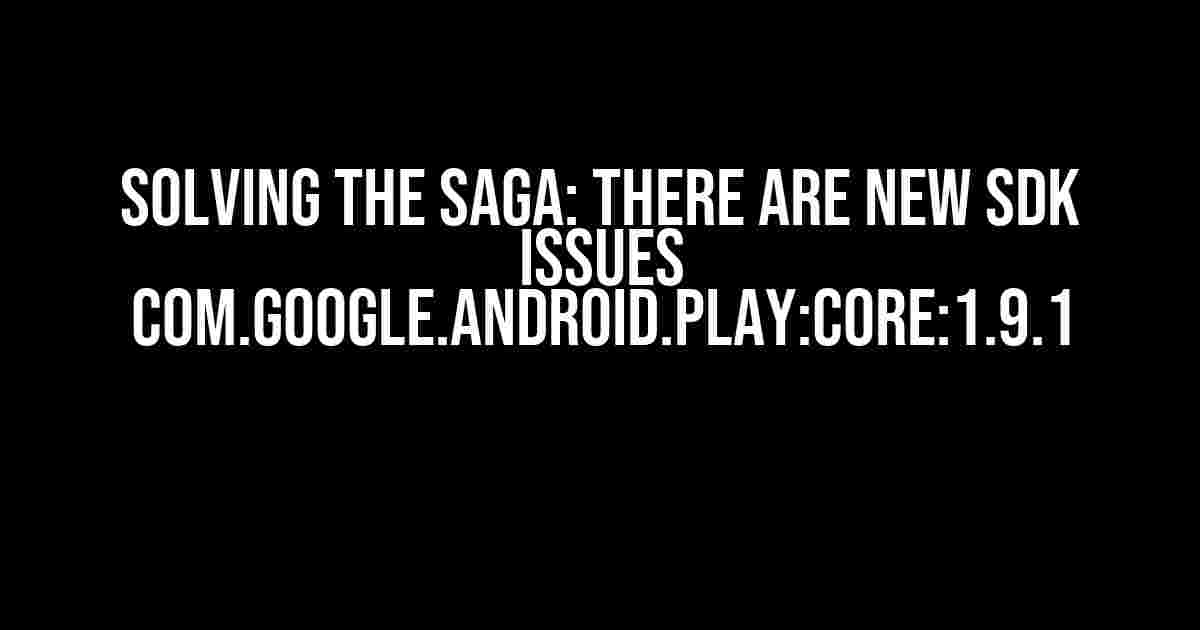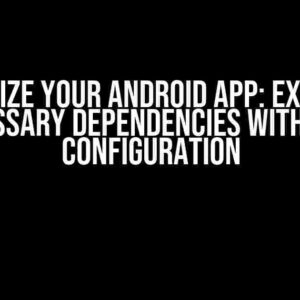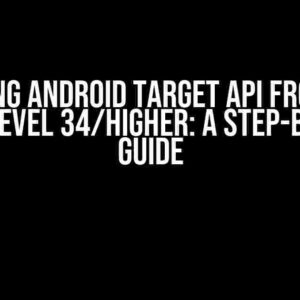Are you tired of encountering the frustrating “There are new SDK issues com.google.android.play:core:1.9.1” error message in your Android app development journey? Worry not, dear developer, for we’ve got you covered! In this comprehensive guide, we’ll delve into the world of SDK issues, explore the possible causes, and provide step-by-step solutions to get your app up and running smoothly.
What’s Behind the Error Message?
The error message “There are new SDK issues com.google.android.play:core:1.9.1” typically occurs when there’s a compatibility issue between the Google Play Core library and other dependencies in your project. This might happen when you’re trying to integrate a new SDK or update an existing one. But don’t panic! We’ll break down the possible causes and their fixes below.
Cause 1: Incompatible Library Versions
One of the most common reasons behind this error is using incompatible library versions. When you update the Google Play Core library to version 1.9.1, it might not be compatible with other libraries in your project.
- Check your build.gradle file and ensure that all library versions are up-to-date and compatible.
- Make sure you’re using the same version of the Google Play Core library throughout your project.
dependencies {
implementation 'com.google.android.play:core:1.9.1'
implementation 'com.google.android.play:core-ktx:1.9.1'
}
Cause 2: Conflicting Dependencies
Sometimes, conflicting dependencies can cause the “There are new SDK issues” error. This might happen when two or more libraries are trying to use the same functionality or resource.
- Review your project’s dependencies and look for any conflicts.
- Use the Android Studio’s “Dependency Graph” feature to visualize your dependencies and identify potential conflicts.
- Exclude or remove conflicting dependencies to resolve the issue.
dependencies {
implementation('com.google.android.play:core:1.9.1') {
exclude group: 'com.android.volley'
}
}
Cause 3: Incorrect Configuration
A misconfigured Android project can also lead to the “There are new SDK issues” error. This might be due to incorrect SDK setup, incorrect module configuration, or missing dependencies.
- Verify that your Android project is configured correctly, and all necessary dependencies are included.
- Check that the Google Play Core library is properly integrated into your project.
- Ensure that the SDK is correctly configured in your module’s build.gradle file.
android {
...
defaultConfig {
...
minSdkVersion 21
targetSdkVersion 30
...
}
...
}
Additional Troubleshooting Steps
If the above solutions don’t resolve the issue, try these additional troubleshooting steps:
Clear the Android Studio Cache
Sometimes, clearing the Android Studio cache can resolve the issue.
- Go to File > Invalidate Caches / Restart.
- Click “Invalidate and Restart” to clear the cache and restart Android Studio.
Check for Android Gradle Plugin Updates
Make sure you’re using the latest version of the Android Gradle Plugin.
classpath 'com.android.tools.build:gradle:4.2.0'
Disable Android Gradle Plugin 4.2.0
If you’re using Android Gradle Plugin 4.2.0, try disabling it and switching to an earlier version.
classpath 'com.android.tools.build:gradle:4.1.3'
Check the Android SDK Manager
Ensure that the Android SDK Manager is up-to-date and all necessary SDKs are installed.
| SDK | Version |
|---|---|
| Android SDK Platform Tools | 30.0.5 |
| Android SDK Build-Tools | 30.0.3 |
Conclusion
In conclusion, the “There are new SDK issues com.google.android.play:core:1.9.1” error can be resolved by identifying and addressing the underlying causes. By following the steps outlined in this guide, you should be able to fix the issue and get your Android app up and running smoothly.
Remember to stay up-to-date with the latest Android SDKs, libraries, and plugins to avoid compatibility issues. If you’re still facing problems, don’t hesitate to reach out to the Android developer community for further assistance.
Happy coding, and may the Android SDKs be ever in your favor!
Additional Resources
- Android Developers: Google Play Core API
- Android Developers: Android Gradle Plugin
- Stack Overflow: Android Google Play Core issues
Frequently Asked Question
Got stuck with the “There are new SDK issues com.google.android.play:core:1.9.1” error? Don’t worry, we’ve got you covered! Below are some frequently asked questions and answers to help you troubleshoot this issue.
What does the “There are new SDK issues com.google.android.play:core:1.9.1” error mean?
This error message indicates that there are compatibility issues with the Google Play Core SDK version 1.9.1 and your app. It’s usually caused by an outdated or mismatched SDK version.
How do I resolve the “There are new SDK issues com.google.android.play:core:1.9.1” error?
To resolve this issue, you can try updating the Google Play Core SDK to the latest version (1.10.0 or higher) in your app’s build.gradle file. You can also check the AndroidManifest.xml file for any conflicting SDK versions.
Can I ignore the “There are new SDK issues com.google.android.play:core:1.9.1” error?
It’s not recommended to ignore this error, as it may cause issues with your app’s functionality and performance. Ignoring the error may lead to crashes, ANRs, or even app rejection during the Google Play Store review process.
How do I check the Google Play Core SDK version in my app?
You can check the Google Play Core SDK version in your app’s build.gradle file. Look for the `com.google.android.play:core` dependency and check the version number. You can also use the Android Studio’s “Project Structure” window to view the dependencies and their versions.
Will updating the Google Play Core SDK version affect my app’s existing functionality?
Updating the Google Play Core SDK version should not affect your app’s existing functionality, but it’s always a good idea to thoroughly test your app after updating the SDK to ensure compatibility and functionality.



